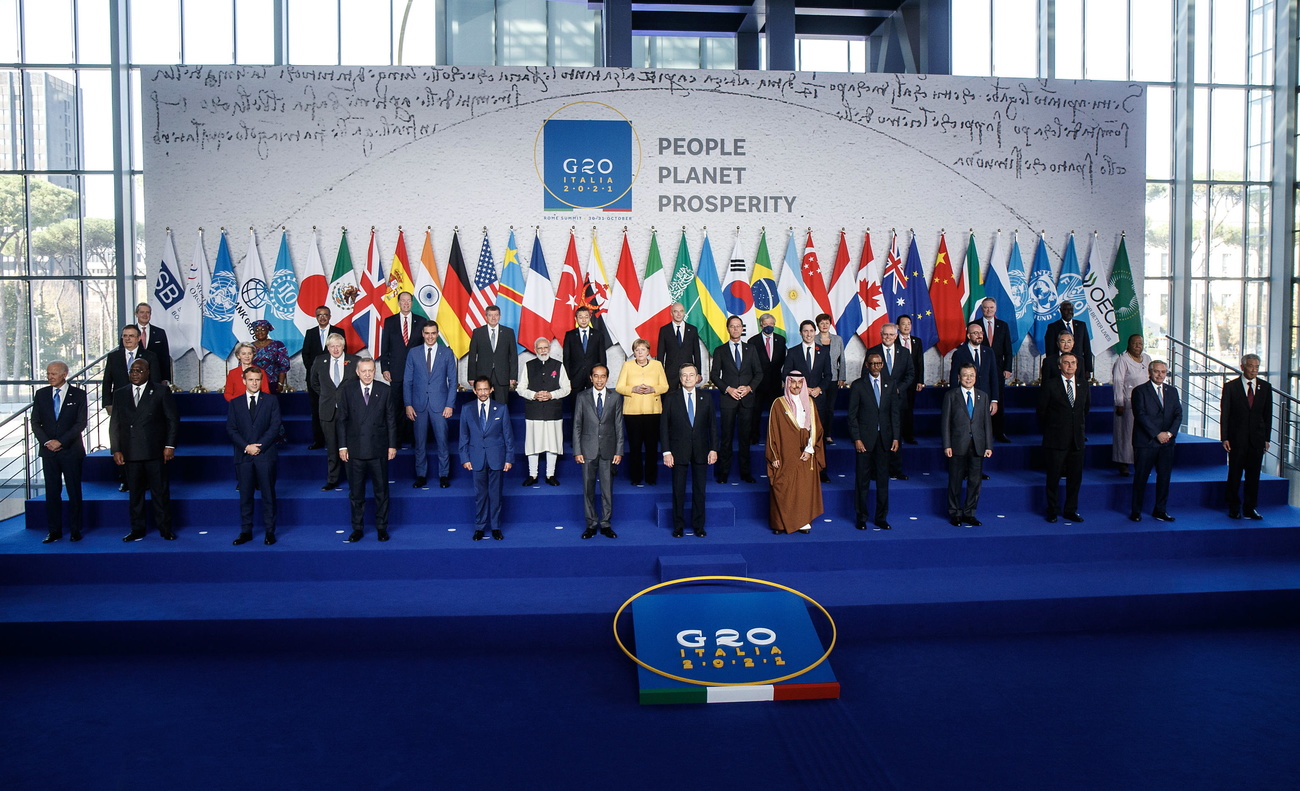
Explainer: the OECD minimum tax vote

On June 18, Swiss voters will decide on the taxation of corporate profits. The focus will be on tax equity, attractiveness of locations and the distribution of additional revenues.
The impetus was external. It came from the G20 countries and the Organisation for Economic Co-operation and Development (OECD). They want to enforce a 15% tax on large companies in 138 countries.
The aim is global tax equity – even if the level is relatively low. Only corporations with an annual turnover of more than €750 million (CHF744 million) will be affected.
How did this bill come to Switzerland?
Currently, multinational corporations can have their income taxed at a low rate or not at all by legally shifting profits to tax havens.
With the minimum tax, the OECD also wants to combat international tax competition. In recent decades this has got out of hand. Individual tax havens and many globally active corporations have profited from such practices.
However, many less-flexible countries with high infrastructure costs have been hit hard, including economic powers such as France and the United States.
In particular, the US has suffered as a result of the tax avoidance strategies used by US digital corporations such as Google, Facebook, Apple or Amazon. That is why the OECD minimum tax was initially also referred to as the digital tax. They are one and the same.
What must Switzerland do now?
In order to introduce the OECD minimum tax, member state Switzerland must amend its constitution. The federal government will need to be able to intervene in the tax sovereignty of the cantons with a “supplementary tax”. For political reasons it also wants to allow unequal treatment of certain groups of companies. That is why the voters will have the final say.
What has Swiss tax policy looked like until now?
Twenty-one of the 26 Swiss cantons have tax rates that are much lower than the required 15%. With lower taxes these cantons have been able to lure corporations. Only classic offshore domiciles such as Guernsey, Qatar or Hungary offer lower tax rates than the low-tax cantons. Ireland remains Switzerland’s main competitor in Europe.
In the past, Switzerland often explained its low-tax policy by arguing that it had to compensate for high wage and location costs in order to be attractive as a business location.
What will be the local impact of the bill?
With the reform, Switzerland will lose an important locational advantage in the short term because it can no longer position itself as a competitive tax regime.
Finance Minister Karin Keller-Sutter acknowledges this but believes it will be bearable: “International tax competition for large, internationally active corporate groups will be restricted,” she recently told the Neue Zürcher Zeitung (NZZ). “But Switzerland has many assets: political stability, legal certainty, a well-qualified workforce and an innovative, adaptable economic environment.”
In the international environment, Switzerland is still one of the most attractive countries, even with a corporate tax rate of 15%, as this chart shows:
How will the minimum tax affect the economy?
Nevertheless, the reform would have an impact on the Swiss economy. But how? The federal government itself describes the effects as “uncertain”. It is not yet known what measures other countries will use to relaunch international tax competition. But no one doubts that this will happen.
It is also uncertain how companies will behave in the future. Despite its size, Switzerland is home to many large companies, including large foreign companies. It is estimated that around 2,000 large corporations will be affected. About 600,000 small and medium-sized enterprises (SMEs) that make a turnover of less than €750 million will not be affected.
What do the advocates say?
The government, parliament and the cantons are campaigning for the bill. The main argument of the supporters is that the reform is unavoidable so, at the very least, the tax base should be kept in the country.
They argue that if Switzerland does not align itself with this OECD reform, other countries would be allowed to use the taxation to siphon off the difference to the 15% and this would result in tax money flowing abroad.
The supporters praise Switzerland’s tax policy to date as “extremely successful”. Economiesuisse, the umbrella organisation of the Swiss business community, says that large international corporations have up to now “significantly financed the steady growth of state services, for example in the social and education sectors”.
How much money is at stake?
The finance ministry estimates the additional tax base generated by this reform to be CHF1-2.5 billion ($1.1-2.75 billion). The total revenue from taxes on company profits in Switzerland is around CHF14 billion.
Where will the money go?
All parties agreed on meeting the main features of the OECD requirement. Discussions flared up around how the additional revenue should be distributed. Should those cantons in which the companies pay tax on their profits benefit most? Or should a larger share flow into the federal treasury to finance expenditures for the general public?
The bill that will now be put to the vote leaves 75% of the additional tax revenue to the cantons. The remaining 25% will go to the federal government.
Those cantons that host the large tax-paying companies will benefit most. The idea is that if their location advantage is levelled out by the minimum tax, these economic cantons could work on their attractiveness in other ways. They could, for example, use the rebate to lower other taxes, make building land available more cheaply, invest in infrastructure or promote innovation.
The other cantons will also benefit from the revenues via the national fiscal equalisation system.
What do the opponents say?
This distribution key is the reason why the left-wing Social Democratic Party has decided to vote No. They say that one consequence of the rebate is that the corporate moguls will pocket practically the entire cantonal pie.
Those on the left believe that this model would only lead to further tax competition among the cantons. They argue that the money should therefore go to the federal government and be invested in infrastructure, in other words go to the people.
Originally, some voices on the left wanted the additional revenues to flow to the Global South, for example where the profits of many companies come from. However, this idea fell by the wayside in parliament.
What if voters reject the minimum tax?
Here there is consensus: Switzerland would incur serious disadvantages. A No vote would not mean a fundamental abandonment of the minimum tax project. Much more likely is that parliament would have to expedite the draft of a new bill with an adjusted distribution key.
Translated from German by Sue Brönnimann
Correction: the article was adapted on April 18, 2023. An earlier version contained imprecise information on the share of tax revenue.

In compliance with the JTI standards
More: SWI swissinfo.ch certified by the Journalism Trust Initiative








































You can find an overview of ongoing debates with our journalists here . Please join us!
If you want to start a conversation about a topic raised in this article or want to report factual errors, email us at english@swissinfo.ch.